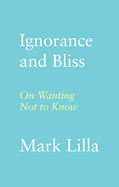
What makes people flee from and reject ideas, facts, and knowledge about events and themselves that are demonstrably and inarguably true? That question is the subject of Ignorance and Bliss: On Wanting Not to Know by Mark Lilla, a humanities professor at Columbia University. Lilla refers to the book as an "intellectual travelogue." By taking readers through examples from ancient Greece, Christianity, psychoanalytic theory, and literature, Lilla entreats believers to see the righteousness of self-knowledge and justice, and builds the case for why individuals or societies--even those who see themselves as knowledge seekers--might shy away from a whole series of possible realizations.
Lilla's problem statement is compellingly put forth and all too recognizable: "Mesmerized crowds follow preposterous prophets, irrational rumors trigger fanatical acts, and magical thinking crowds out common sense and expertise." Readers will find accounts of ways in which people delude themselves, including neurological disorders such as anosognosia (which prevents "people from recognizing their own physical or mental condition"). He also dissects self-delusion as a result of societal taboos, and how the absence of responsibility can accompany willful ignorance. Lilla also discusses how self-delusion can serve and protect, and examines the limits of human knowledge itself.
Ignorance and Bliss is a thoroughly engaging and accessibly rigorous read in which everyone can find a bit of themselves and their circumstances to reflect upon. Knowledge, it seems, always comes at a cost. As Lilla concisely puts it, "Knowing is an emotional experience." --Elizabeth DeNoma, executive editor, DeNoma Literary Services, Seattle, Wash.

